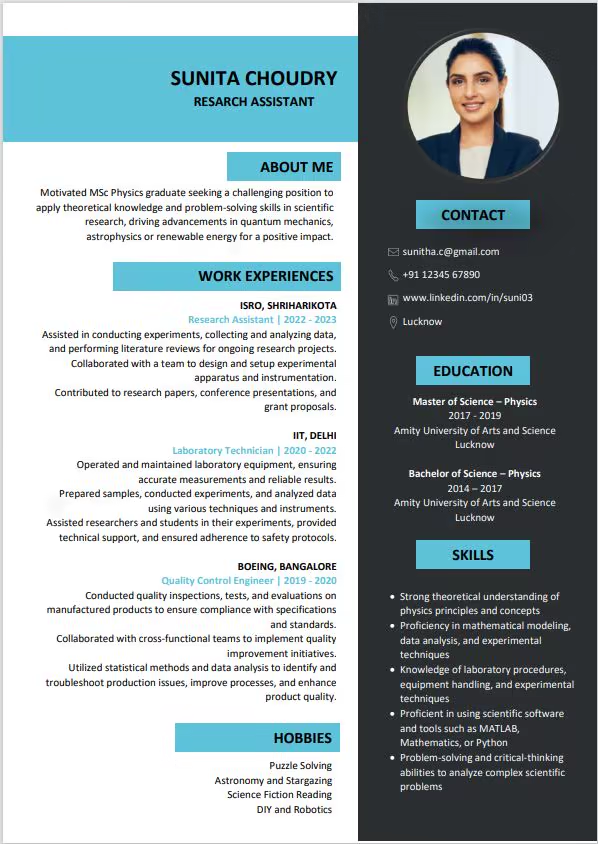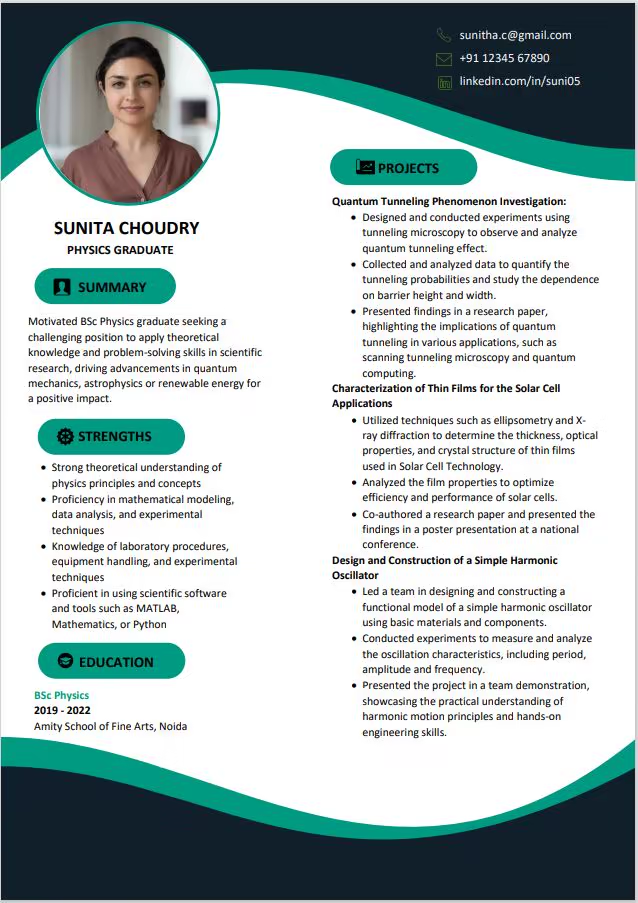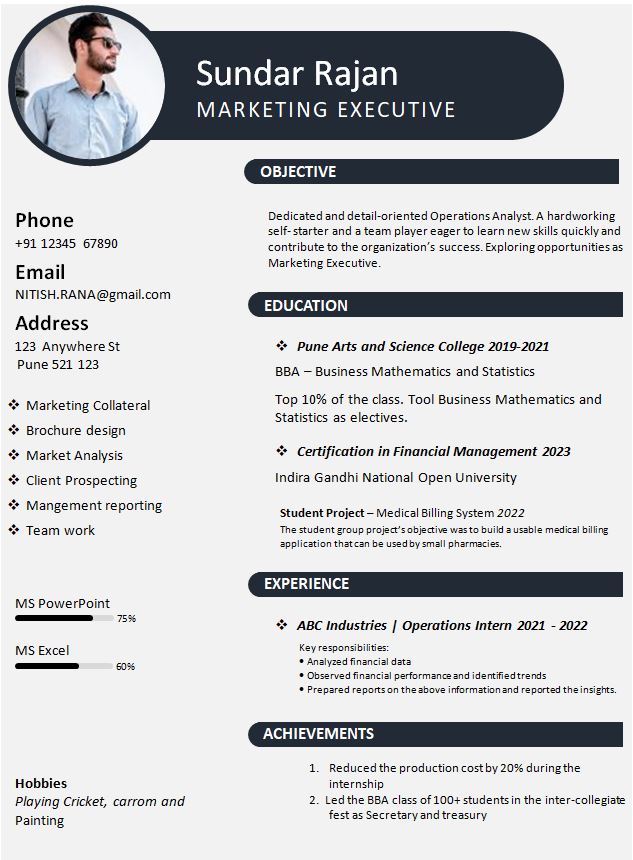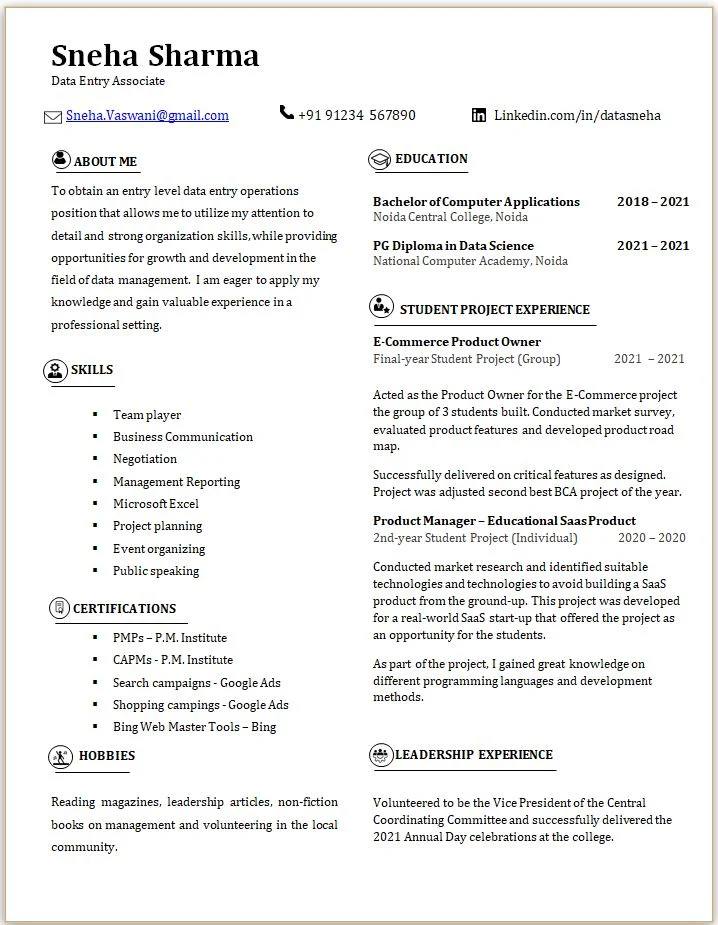Modern Resume
BSc Physics Sample Resume
Research Assistant
Physics

Objective
Motivated MSc Physics graduate seeking a challenging position to apply theoretical knowledge and problem-solving skills in scientific research, driving advancements in quantum mechanics, astrophysics or renewable energy for a positive impact.
Education
BSc Physics, MSc Physics
Skills
• Strong theoretical understanding of physics principles and concepts
• Proficiency in mathematical modeling, data analysis, and experimental techniques
• Knowledge of laboratory procedures, equipment handling, and experimental techniques
• Proficient in using scientific software and tools such as MATLAB, Mathematics, or Python
• Problem-solving and critical-thinking abilities to analyze complex scientific problems
Projects
If you are in the final year of your BSc or MSc Physics courses, getting a job as soon as you graduate may be is what is occupying your mind most of the time.
We suggest that you should use the time you still have available in the college to work on projects that will get your resume a lot of attention when you finish and include these projects in your resume.
Here are two such project ideas that we believe are worthy of pursuing to get employer attention.
Project 1: Quantum Computing Simulations and Algorithms:
Develop a project that involves simulating quantum computing algorithms and their applications. Quantum computing is an emerging field with potential applications in cryptography, optimization, and materials science.
You could:
1. Implement and simulate basic quantum gates and algorithms using quantum programming frameworks like Qiskit or Cirq.
2. Explore the concept of quantum entanglement and its role in quantum algorithms.
3. Investigate the effects of noise and error correction on quantum computations.
4. Create a quantum-inspired optimization algorithm for solving real-
world problems.
Why this project makes sense
This project demonstrates your expertise in quantum physics, programming, and algorithm development, which are skills highly sought after in industries like quantum computing, cryptography, and technology research.
Project 2 - Data Analysis in Astrophysics:
Undertake a project that involves analyzing astronomical data to extract meaningful insights. Astrophysics combines physics with data analysis and computational skills.
You could:
1. Analyze light curves from space telescopes to identify exoplanets or study variable stars.
2. Use machine learning techniques to classify galaxies or detect rare astronomical phenomena.
3. Model the motion of celestial bodies and predict celestial events.
Collaborate with observatories to process and interpret observational data.
Why this project makes sense
This project showcases your ability to work with complex datasets, apply statistical methods, and derive scientific conclusions. These skills are valuable in industries related to data science, astronomy, and space exploration.
When working on these projects, ensure you document your process, methodologies, and findings thoroughly. Being able to discuss your projects during interviews and showcase your practical skills through tangible examples can greatly enhance your employability.
Additionally, consider seeking guidance and mentorship from your professors or researchers in the respective fields to make the most of these projects.
Interests/Hobbies
These are some of the hobbies that we regularly see listed on BSc and MSc physics resumes. Consider listing these as long as these are genuinely your hobbies as well.
1. Puzzle Solving
2. Astronomy and Stargazing
3. Science Fiction Reading
4. DIY and Robotics
Below are a few more generic hobbies and interests for you to consider listing on your resume.
1. Chess or Strategy Games: Shows your strategic thinking, problem-solving abilities, and analytical mindset—skills that are highly valued in the field of physics.
2. Hiking or Nature Photography: Suggests an appreciation for the natural world, and it can also highlight qualities like perseverance and attention to detail.
3. Programming: Demonstrates your technical skills, such as programming languages like Python or MATLAB, which are often used in data analysis and simulations in physics research.
4. Music and Instrument Playing: Showcases your creativity and dedication, as learning and playing a musical instrument requires discipline and an understanding of patterns and harmonies—similar to the logical thinking in physics.
5. Volunteer Work or Community Outreach: Demonstrates your commitment to making a positive impact, and it can highlight your communication and teamwork skills—qualities that are valuable in both academic and professional settings.
Experience
ISRO, SHRIHARIKOTA
Research Assistant | 2022 - 2023
1. Assisted in conducting experiments, collecting and analyzing data, and performing literature reviews for ongoing research projects.
2. Collaborated with a team to design and setup experimental apparatus and instrumentation.
Contributed to research papers, conference presentations, and grant proposals.
IIT, DELHI
Laboratory Technician | 2020 - 2022
1. Operated and maintained laboratory equipment, ensuring accurate measurements and reliable results.
2. Prepared samples, conducted experiments, and analyzed data using various techniques and instruments.
3. Assisted researchers and students in their experiments, provided technical support, and ensured adherence to safety protocols.
BOEING, BANGALORE
Quality Control Engineer | 2019 - 2020
1. Conducted quality inspections, tests, and evaluations on manufactured products to ensure compliance with specifications and standards.
2. Collaborated with cross-functional teams to implement quality improvement initiatives.
3. Utilized statistical methods and data analysis to identify and troubleshoot production issues, improve processes, and enhance product quality.
Additional Inputs
An increasing number of Physics graduates consider higher education as an immediate next step once they graduate. If you are one of them, here are some resources for you to consider exploring -
Educational Websites:
GradSchools.com: Offers information about various graduate programs, admission requirements, and scholarships.
Peterson's: Provides guides to graduate school programs, admission tips, and test preparation resources.
Studyportals: Allows you to search for international master's programs and provides information on application processes.
University Websites:
Most universities have detailed information about their graduate programs, admission criteria, faculty profiles, and research areas. Exploring the websites of universities you're interested in can provide insights into potential higher study options.
Online Courses and MOOCs:
Platforms like Coursera, edX, and Khan Academy offer free online courses that can help you explore topics related to your field of interest. These courses can provide a glimpse into what advanced studies might involve.
Professional Organizations:
Many professional organizations in the field of physics offer resources for students considering higher studies. For example:
American Physical Society (APS)
Institute of Physics (IOP)
European Physical Society (EPS)
Research Journals and Publications:
Reading research articles in physics journals can help you stay updated on the latest advancements in your field of interest. This knowledge can guide your decisions about specialization and potential research areas.
Discussion Forums and Social Media Groups:
Online communities like Reddit (r/Physics), Physics Stack Exchange, and LinkedIn groups related to physics can provide insights and discussions about various graduate programs and opportunities.
Career Services at Your Current Institution:
Your university's career services department can offer guidance on pursuing higher studies, including assistance with application processes, personal statements, and recommendation letters.
Networking:
Connect with professors, researchers, and graduate students at your current institution to gather insights and advice about pursuing higher studies. Attending seminars, workshops, and conferences can also provide networking opportunities.
Open Access Repositories:
Explore repositories like arXiv for preprints and research papers. This can help you delve into current research trends and identify potential areas of interest.
Webinars and Online Seminars:
Keep an eye out for webinars and online seminars organized by universities or physics-related organizations. These events often cover topics related to higher studies and career paths.
Remember that combining information from multiple sources and seeking advice from professors and mentors can provide a well-rounded perspective on your options for pursuing higher studies in physics.


